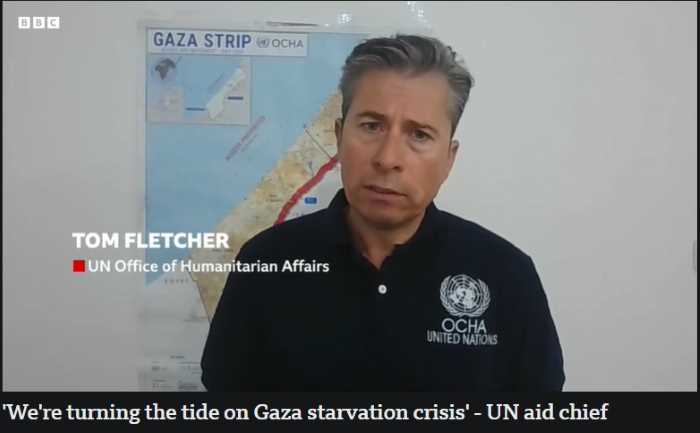Listen to the article
UN Aid Chief’s Claims on Gaza Humanitarian Situation Questioned
A recent BBC News interview with UN OCHA’s Under-Secretary-General for Humanitarian Affairs Tom Fletcher has drawn criticism for potentially misleading statements regarding aid deliveries to Gaza following the October 9th ceasefire agreement.
In the October 18th BBC segment titled “‘We’re turning the tide on Gaza starvation crisis’ – UN aid chief,” Fletcher claimed a significant improvement in aid delivery, stating: “We are getting hundreds of trucks in a day now and thousands of trucks a week. That’s a big shift from where we were before President Trump’s ceasefire deal.”
However, data from the Israeli Coordination of Government Activities in the Territories (COGAT) indicates that comparable volumes of aid were already entering Gaza before the ceasefire. Records show 430 trucks entered on September 25th, 400 on September 28th, 430 on September 29th, and 600 on October 5th. In the days immediately preceding the agreement, 510 trucks entered on October 8th, followed by 500 on October 9th – the day the ceasefire was signed.
This evidence contradicts Fletcher’s characterization of the post-ceasefire aid flow as representing a dramatic improvement from previous conditions. Critics argue that such statements paint an inaccurate picture of the humanitarian situation’s trajectory.
Fletcher’s visit to Gaza City highlighted a bakery that he claimed was “as of yesterday” producing 300,000 pieces of bread daily. While this represents a significant local production capacity, COGAT had already reported on October 8th that bakeries across Gaza were collectively producing 4.2 million pita breads daily, suggesting that bread production had been substantial even before the ceasefire.
The UN official also called for opening “all those crossings” to improve aid delivery. This statement came just a day after Fletcher had claimed on social media that aid trucks were entering via the Kerem Shalom crossing specifically because of the ceasefire agreement. Critics point out that this crossing, along with others, had been fully operational well before the ceasefire took effect, with hundreds of trucks entering on working days.
Additionally, Fletcher’s statement that “we need to get the commercial market to start operating properly again” has been questioned. Evidence from COGAT and social media reports indicate that markets, shops, supermarkets, cafes, and restaurants are already functioning in various parts of Gaza, though the extent and consistency of operations across the territory remains unclear.
This is not the first time Fletcher’s public statements have been scrutinized. Critics have previously accused him of promoting claims that did not accurately reflect conditions on the ground. Despite these concerns, the BBC continues to provide him with a platform to discuss humanitarian conditions in Gaza.
The conflicting narratives highlight the challenges in obtaining accurate assessments of Gaza’s humanitarian situation. While improvements in aid delivery and food security are critical objectives, precise and accurate reporting on progress remains essential for effective coordination of relief efforts and maintaining public trust in humanitarian organizations.
Neither the BBC nor Fletcher’s office has responded to queries about the accuracy of his statements or the apparent discrepancies between his characterization of the situation and data from other sources. As the humanitarian response continues, transparency and factual reporting will remain crucial for addressing Gaza’s ongoing needs.
Verify This Yourself
Use these professional tools to fact-check and investigate claims independently
Reverse Image Search
Check if this image has been used elsewhere or in different contexts
Ask Our AI About This Claim
Get instant answers with web-powered AI analysis
Related Fact-Checks
See what other fact-checkers have said about similar claims
Want More Verification Tools?
Access our full suite of professional disinformation monitoring and investigation tools




5 Comments
The BBC’s role in providing a platform for disputed claims is concerning. As a public broadcaster, they have a responsibility to ensure the information they disseminate is factually sound, especially when it relates to critical humanitarian situations. I hope they will re-evaluate their editorial process in this case.
This is an important issue that deserves careful scrutiny. The BBC should strive to present a balanced and well-researched perspective, drawing on authoritative data and multiple viewpoints. Accurate reporting on humanitarian aid is crucial.
I appreciate the BBC’s efforts to cover important global issues, but it’s crucial that they ensure the information they present is thoroughly verified, especially when it concerns aid deliveries to vulnerable populations. Fact-checking and context are essential for responsible journalism.
Disputed claims about humanitarian aid should be approached with caution. The BBC has a responsibility to its audience to provide accurate and impartial reporting, drawing on reliable data and multiple credible sources. I hope they will investigate this matter further.
This is an interesting and complex issue. The BBC should be transparent about the accuracy of claims made on its platform, especially when they involve critical humanitarian situations. It would be helpful to see a more balanced reporting that scrutinizes the data and facts.